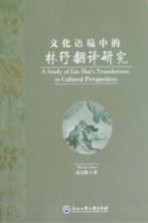

文化语境中的林纾翻译研究PDF电子书下载
- 电子书积分:11 积分如何计算积分?
- 作 者:高万隆著
- 出 版 社:杭州:浙江工商大学出版社
- 出版年份:2012
- ISBN:9787811406290
- 页数:259 页
Chapter 1 Introduction 1
1.1 Lin Shu:A Controversial Figure in Chinese Translation History 3
1.2 Significance of the Research on Lin Shu 4
1.2.1 Need for Reevaluation of Lin Shu's Translations 4
1.2.2 Lin Shu,Father of China's Modern Literary Translation 6
1.2.3 Influence of Lin Shu's Translations 8
1.3 Theoretical and Empirical Contribution of the Study to Translation Studies 18
1.4 Structure of the Work 20
Chapter 2 Lin Shu'S Works Within a Target-oriented/Culture-oriented Framework 23
2.1 Target-oriented/Culture-oriented Translation Theories 23
2.1.1 Toury's Target-oriented Translation Theory 26
2.1.1.1 Translators'Main Goals 26
2.1.1.2 The Role and Function of Translation 28
2.1.1.3 Translation Strategies 28
2.1.2 Culture-oriented Translation Studies 30
2.1.3 Readers'Response and Reception Theory 34
2.2 Cultural Translation Studies in China 40
2.2.1 Target-oriented/Culture-oriented Translation Approach 43
2.2.2 Contextual Analysis 44
2.2.3 Textual Analysis 44
Chapter 3 Critical Literature Review on Lin Shu 45
3.1 Chinese Criticism 45
3.1.1 Affirmation by Lin Shu's Contemporaries 46
3.1.2 Condemnation During the May Fourth New Culture Movement 47
3.1.3 Assessment After Lin Shu's Death 52
3.1.3.1 General Reviews 52
3.1.3.2 Zheng Zhenduo's"Mr Lin Qinnan" 57
3.1.3.3 Han Guang's"Lin Qinnan" 60
3.1.4 Negative Criticism from 1949 to 1979 64
3.1.5 Revival:1980s Onwards 66
3.1.5.1 Qian Zhongshu's"Lin Shu's Translations" 66
3.1.5.2 New Critical Interest 69
3.2 Western Criticism 72
3.3 Key Issues in Dispute Concerning the Assessment of Lin Shu 79
3.3.1 Lin Shu's Thought:Conservative or Reformist? 81
3.3.2 A Pioneer or an Opponent of Modern Chinese Culture? 86
Chapter 4 Lin Shu in Cultural Context 95
4.1 Lin Shu's Translations in the Cultural Context 95
4.1.1 Lin Shu's Choice and Response 95
4.1.1.1 In Search of Similarities 97
4.1.1.2 Literary Subject Matters 99
4.1.1.3 Literary Genres 107
4.1.1.4 Literary Style and Technique 110
4.1.2 Output of Lin Shu's Translations 114
4.1.3 Lin Shu's Translation Practice 115
4.1.3.1 Joint Translation 116
4.1.3.2 Paraphrase or Free Translation 118
4.2 Case Study:Bali Chahuanii Yishi―Transfiguring Chinese Fiction 121
4.2.1 Ideological Content 122
4.2.2 Characterization 130
4.2.3 Literary Form 133
Chapter 5 Poetic Equivalence 136
5.1 Poetic Equivalence and Lin Shu 136
5.2 Spirit and Style 140
5.3 Expression in Literary Language 149
5.4 Sinicization 155
Chapter 6 Beyond Equivalence 165
6.1 Adaptation 165
6.2 Omission 169
6.2.1 To Overcome"Cultural Default" 170
6.2.2 Simplification for Succinctness 173
6.2.3 Treatment of Western Religious Materials 180
6.3 Addition 185
6.3.1 To Make up"a Perceived Void"in the Original Text 186
6.3.2 To Embellish the Original Text 188
6.3.3 To Bridge the Cultural Gap 191
6.4 Alteration 195
6.4.1 To Heighten the Readers'Impression 196
6.4.2 To Rewrite the Original Text 199
6.4.3 Intervention into Translation 205
6.5 Abridgement 212
Chapter 7 An Exemplar of Chinese Literary Translation 217
Bibliography 220
Glossary 241
List of Lin Shu's Translated Works 251
- 《红色旅游的社会效应研究》吴春焕著 2019
- 《汉语词汇知识与习得研究》邢红兵主编 2019
- 《生物质甘油共气化制氢基础研究》赵丽霞 2019
- 《东北民歌文化研究及艺术探析》(中国)杨清波 2019
- 《联吡啶基钌光敏染料的结构与性能的理论研究》李明霞 2019
- 《异质性条件下技术创新最优市场结构研究 以中国高技术产业为例》千慧雄 2019
- 《英汉翻译理论的多维阐释及应用剖析》常瑞娟著 2019
- 《《国语》和《战国策》词汇比较研究》陈长书著 2017
- 《中国制造业绿色供应链发展研究报告》中国电子信息产业发展研究院 2019
- 《行政保留研究》门中敬著 2019
- 《中风偏瘫 脑萎缩 痴呆 最新治疗原则与方法》孙作东著 2004
- 《水面舰艇编队作战运筹分析》谭安胜著 2009
- 《王蒙文集 新版 35 评点《红楼梦》 上》王蒙著 2020
- 《TED说话的力量 世界优秀演讲者的口才秘诀》(坦桑)阿卡什·P.卡里亚著 2019
- 《燕堂夜话》蒋忠和著 2019
- 《经久》静水边著 2019
- 《魔法销售台词》(美)埃尔默·惠勒著 2019
- 《微表情密码》(波)卡西亚·韦佐夫斯基,(波)帕特里克·韦佐夫斯基著 2019
- 《看书琐记与作文秘诀》鲁迅著 2019
- 《酒国》莫言著 2019
- 《大学计算机实验指导及习题解答》曹成志,宋长龙 2019
- 《浙江海岛植物原色图谱》蒋明,柯世省主编 2019
- 《大学生心理健康与人生发展》王琳责任编辑;(中国)肖宇 2019
- 《大学英语四级考试全真试题 标准模拟 四级》汪开虎主编 2012
- 《大学英语教学的跨文化交际视角研究与创新发展》许丽云,刘枫,尚利明著 2020
- 《复旦大学新闻学院教授学术丛书 新闻实务随想录》刘海贵 2019
- 《大学英语综合教程 1》王佃春,骆敏主编 2015
- 《美丽浙江 2016 法语》浙江省人民政府新闻办公室编 2016
- 《二十五史中的浙江人 24》浙江省地方志编纂委员会编 2005
- 《大学物理简明教程 下 第2版》施卫主编 2020
